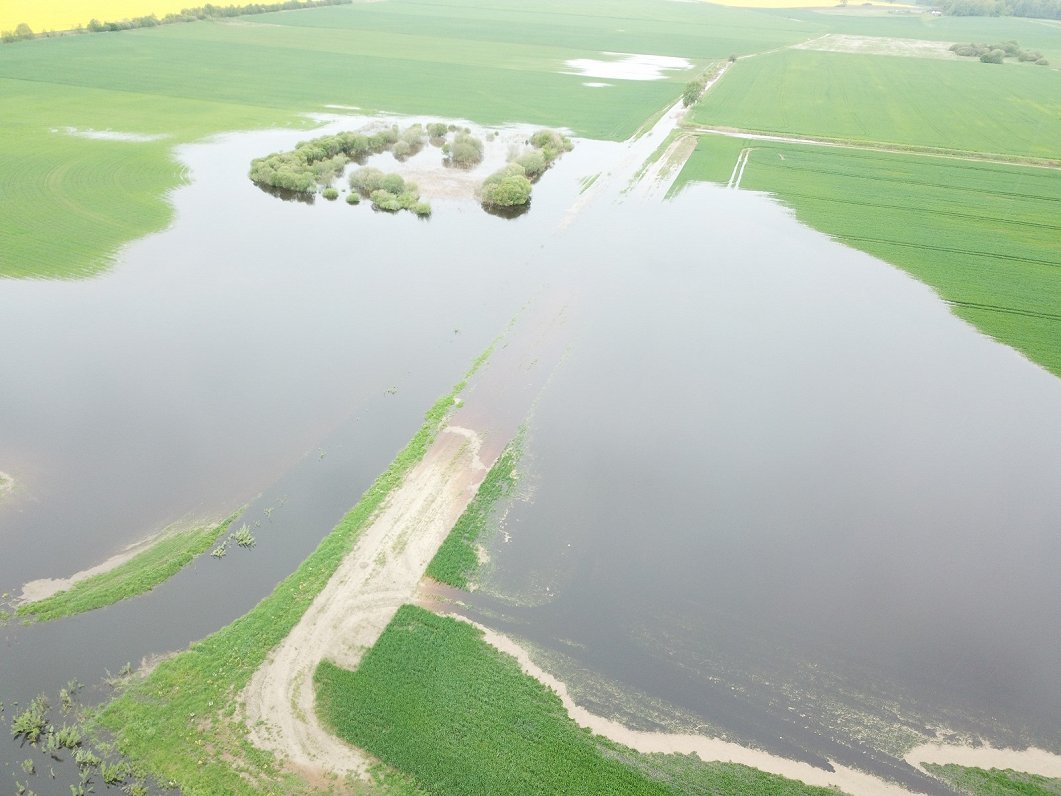An unusually warm period at the beginning of spring was followed by frosts and then more than two weeks of rain. In many places in Latgale, crops have been flooded, peas and beans have rotted, but farmers are still unable to drive onto their fields to plough them. Some potato growers have not even been able to start planting. It is too early to talk about the extent of the losses, Latvian Radio reported on 29 May.
"In my 34 years of farming, I don't remember anything like this in May," said Guntars Bartkevičs, owner of the "Riekstiņi un Amatnieki" farm in Baltinava parish, after surveying flooded crops near the Latvian-Russian border. "If we hadn't had to resow the winter crops this year, they would all have survived the winter, but now it looks like some of the summer crops will be unripe, rotten and will have to be resown, but there is no time left and we will have to think about other crops."
There are 5,000 hectares of land intended for sowing, and 4,500 hectares have been sown, some of which have been flooded.
"It is difficult to say what will happen next, what the losses will be for other crops after these rains. We have identified 200-300 hectares where nothing will grow. The seeds have simply rotted due to excessive moisture and lack of oxygen."
The unusual situation caused by the rains has also affected potato growers, as those who have already planted potatoes are seriously concerned about seed damage, while those who waited may be the winners.
Gunārs Andersons, a potato grower with 20 years of experience in Ozolaines parish in the Rēzekne region, said that this year he is only planning to plant 20 tonnes of potatoes. He said that there was a year when potatoes were planted shortly before Midsummer, so he is not worried for now:
"I'm not doing anything at the moment. The land has been ploughed, but not completely. I'm waiting. I've already tried to drive into the field twice. I've planted half a hectare of the 15 hectares and am waiting for better weather. The fields are very wet at the moment. Today we are repairing the road. We are buying gravel, and about 40 tonnes need to be brought to the roads and repaired, because when planting begins, there will be no time to think about it."
This spring, heavy rains have mainly affected the central and eastern parts of the country. Mārtiņš Trons, a member of the board of the association Farmers' Saeima, pointed to the Daugavpils area, where three months' worth of rain fell. In Latgale as a whole, two months' worth of rain fell in May. The prolonged rains not only washed away mineral fertilisers from the fields, but also delayed the sowing of winter crops, and it now looks as if fodder preparation will also be delayed.
"The most difficult situation is in the Madonna area, where 150 millimetres of rain fell in May, although the norm for May is 69 millimetres. As a result, fields are flooded, low-lying areas are flooded, water levels in rivers have risen, and we can only hope that these water levels will fall rapidly. The situation is further complicated by the fact that livestock farms in Latvia are already starting to prepare fodder. Most likely, we will have to wait," said Trons.
Losses are not yet predictable
"At the moment, we have received a total of 47 claims from our customers and have already paid out half a million euros for damaged agricultural crops," explained Ivo Danče, representative of the insurance company BTA. "But this is related to winter risks, to the fact that they did not survive the winter. As for the damage caused by the recent rains, we have not received any claims from our customers."
It is too early to talk about claims for compensation for damage caused by rain, as the extent of the damage is not yet known or assessed, said the insurance company representative, adding that each case will be seen individually.
Guntars Bartkevičs, one of the largest farmers in the Latvian-Russian border region, has almost all of his agricultural land drained and his crops insured, but this time it will most likely not save him from losses.
"At the moment, this rainfall is not covered by insurance. The seeds must be washed out and taken away, but seeds that rot in the ground due to excessive moisture are not covered by insurance. We have already discussed this with the insurers," explained the farmer.
In Latvia, crops are currently insured by three insurance companies.
Source - https://eng.lsm.lv













